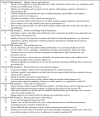Transforming primary care training--patient-centered medical home entrustable professional activities for internal medicine residents
- PMID: 22997002
- PMCID: PMC3663955
- DOI: 10.1007/s11606-012-2193-3
Transforming primary care training--patient-centered medical home entrustable professional activities for internal medicine residents
Abstract
Introduction: The U.S. faces a critical gap between residency training and clinical practice that affects the recruitment and preparation of internal medicine residents for primary care careers. The patient-centered medical home (PCMH) represents a new clinical microsystem that is being widely promoted and implemented to improve access, quality, and sustainability in primary care practice.
Aim: We address two key questions regarding the training of internal medicine residents for practice in PCMHs. First, what are the educational implications of practice transformations to primary care home models? Second, what must we do differently to prepare internal medicine residents for their futures in PCMHs?
Program description: The 2011 Society of General Internal Medicine (SGIM) PCMH Education Summit established seven work groups to address the following topics: resident workplace competencies, teamwork, continuity of care, assessment, faculty development, 'medical home builder' tools, and policy. The output from the competency work group was foundational for the work of other groups. The work group considered several educational frameworks, including developmental milestones, competencies, and entrustable professional activities (EPAs).
Results: The competency work group defined 25 internal medicine resident PCMH EPAs. The 2011 National Committee for Quality Assurance (NCQA) PCMH standards served as an organizing framework for EPAs.
Discussion: The list of PCMH EPAs has the potential to begin to transform the education of internal medicine residents for practice and leadership in the PCMH. It will guide curriculum development, learner assessment, and clinical practice redesign for academic health centers.
Comment in
-
Capsule commentary on Chang et al., Transforming primary care training--patient-centered medical home entrustable professional activities for internal medicine residents.J Gen Intern Med. 2013 Jun;28(6):837. doi: 10.1007/s11606-013-2438-9. J Gen Intern Med. 2013. PMID: 23605400 Free PMC article. No abstract available.
References
-
- Julian K, Riegels NS, Baron RB. Perspective: creating the next generation of general internists: a call for medical education reform. Acad Med. 2011;86(11):1443–7. - PubMed
Publication types
MeSH terms
LinkOut - more resources
Full Text Sources
Miscellaneous




